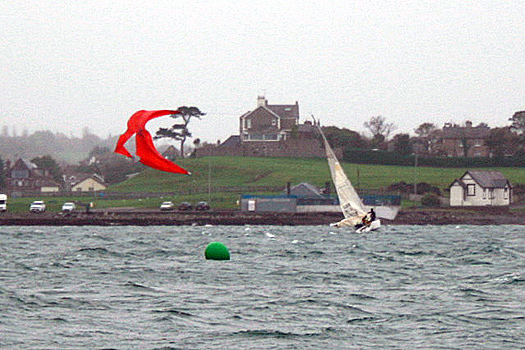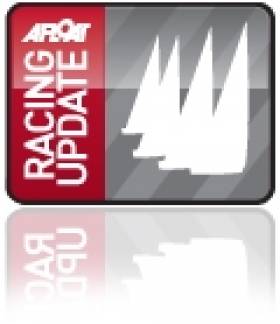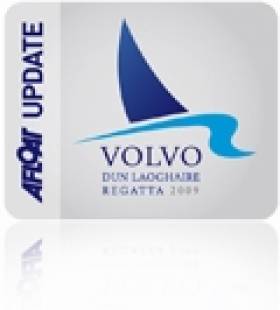Displaying items by tag: Series
'Chain Gang' Prevails in Belfast Lough Autumn League
What better way to energise yourself on a Sunday morning than going sailing? Last Sunday provided great conditions for the third race of the Mackey Eyecare Autumn Series. With winds gusting over 25 knots there was plenty of excitement to be watched from the shore, as the fleets were running downwind with spinnakers up and the odd death roll - mind you, the spinnakers were 'chicken chutes'. Despite the strong winds, racing was very close in the IRC class.
The top four boats finished within a minute of each other on corrected time. Ken Halliwell in CHAIN GANG was only 16 seconds ahead of Ian Wilson's RESPECT, despite Ken having two reefs in his mainsail. Ian flew his asymmetric spinnaker which kept him upright. The crew in TROUBLE had plenty of excitement when they broached and eventually ripped their spinnaker in two!

Cruiser racers run into problems on Belfast Lough
The six boat Sigma fleet had great close racing with some flying spinnakers and others not doing so. The Sherwoods and Taylors in SULA led from the start and managed to stay ahead of Paul Prentice in SQUAWK. IMPULZ put in a good race with the Johnston Brothers sticking to whitesails and still finishing third.
The IRC Whitesail shortened sails like the rest of the fleets and once again John Moorhead in MARGARITA notched up another win from Messrs Adair, Johnston and Jordan in ENIGMA.
There are two more weeks to go in the Mackey Opticians Autumn Series and with one discard to kick in, it's close competition in the IRC and Sigma classes.
RESULTS
IRC 1st Chain Gang - Ken Halliwell
2nd Respect - Ian Wilson
3rd Rattle 'n Hmm – Messrs Harrington, McVicar & McClugan
Sigma 33 – 1st Sula – Taylor & Sherwood
2nd Squawk – Paul & Emma Prentice
3rd IMPULZ – Johnston Bros
Whitesail 1st Margarita – J Moorhead
2nd Enigma – Messrs Adair, Johnston & Jordan
Irish Sea Events Offer Entry Discounts
"The way this works is that the Clyde Cruising Club are offering a 25% rebate for boats from the 4 Dun Laoghaire Clubs (DMYC, NYC, RIYC, RStGYC) that enter the Brewin Dolphin Scottish series before the expiration of the early bird discount period which expires on April 22nd explained Dun Laoghaire event secretary, Ciara Dowling.
As a reciprocal arrangement the committee of the Volvo Dun Laoghaire Regatta are offering a discount of 50% from the full entry fee to all boats that enter both regattas. To avail of this, boats must register for the early bird entry fee in the Volvo Dun Laoghaire Regatta prior to 2 May 2011. Note the 50% discount will be applied to the full entry fee rate and not the early bird rate.
To avail of this arrangement for the Scottish Series contact the Brewin Dolphin Scottish Series office for details, [email protected] 0044141 221 2774.
To avail of this arrangement for the Volvo Dun Laoghaire regatta visit the event website at www.dlregatta.org or email [email protected]
The Scottish Series takes place from 27–30 May and the Dun Laoghaire regatta from July 7th–10th 2011.
In a further boost for Dun Laoghaire sailors heading north the feeder race from Bangor to Tarbert has been re-instated.
Troon and Largs Marinas are offering competitors berthing rate discounts around Scottish Series.
Competitors from Scotland coming to Dun Laoghaire are reminded that the entry fee to the regatta includes free berthing for the duration of the event.
The official Notice of Race and Online Entry are now available at www.dlregatta.org






























































